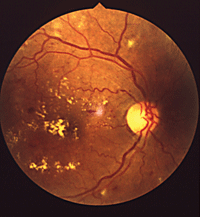For the first time, research-ers have found direct experimental evidence that diabetes is linked to the onset of Alzheimer’s disease. A large part of the study successfully employed an examination of the retina for signs of Alzheimer’s disease.

New research has found a link between diabetes and Alzheimer’s disease. This opens up the possibility of using retinal exams to detect Alzheimer’s in patients with diabetes (such as this one). Photo: Christopher W. Lievens, O.D.
This opens up the possibility of detecting Alzheimer’s in the eye. “Our findings indicate that scientists may be able to follow the onset and progression of Alzheimer’s disease through retinal examination, which could provide a long sought-after early warning sign of the disease,” said study co-author Peter Frederikse, Ph.D., of the department of Pharmacology & Physiology at the University of Medicine and Dentistry of New Jersey (UMDNJ).
Prior research has shown that levels of brain insulin and its related receptors are lower in individuals with Alzheimer’s disease. This recent study, published online in the Journal of Alzheimer’s Disease, may suggest that diabetes actually appears to instigate Alzheimer’s.
UMDNJ researchers collaborated with scientists from Northwestern University in Illinois and employed a physiological model of Alzheimer’s neuropathology in diabetic rabbits. At the study’s completion, they found a five-fold increase in amyloid-beta peptides—a hallmark of Alzheimer’s disease—in the brain cortex and hippocampus. They also found significant amyloid-beta accumulation in ganglion and inner nuclear cell layers of the retina.
By contrast, when diabetes was not present, they detected no observable pathology in either the brain or the retina.
“Our study identifies emergence of AD [Alzheimer’s disease] pathology in brain and retina as a major consequence of diabetes; implicating dysfunctional insulin signaling in late-onset AD, and a potential relationship between [amyloid-beta]-derived neurotoxins and retinal degeneration in aging and diabetes, as well as AD,” the researchers wrote.
“In light of the near-epidemic increases in Alzheimer’s disease and diabetes today, developing a physiological model of Alzheimer neuropathology has been an important goal,” said Chinnaswamy Kasinathan, Ph.D., another member of the research team. “It allows us to identify a potential biomarker for Alzheimer’s disease and may also make important contributions to Alzheimer drug testing and development.”
Bitel CL, Kasinathan C, Kaswala RH, et al. Amyloid-β and Tau pathology of Alzheimer’s disease induced by diabetes in an animal model. J Alzheimers Dis. 2012 Jul 11. [Epub ahead of print]

